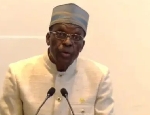CJ introduces new guidelines for serving court processes to Parliamentary officials
 Chief Justice Gertrude Torkornoo
Chief Justice Gertrude Torkornoo
Chief Justice Gertrude Sackey Torkornoo has issued new guidelines detailing the procedures for serving court processes to key Parliamentary figures.
The guidelines spell out procedures for serving court processes on the Speaker of Parliament, the Clerk of Parliament, and Members of Parliament (MPs), to prevent disruption to parliamentary functions.
In a circular directed at Registrars and Court Bailiffs, the Chief Justice specified that court processes intended for the Speaker of Parliament should now be served exclusively to the Legal Department of the Parliamentary Service on Mondays during regular working hours.
For the Clerk of Parliament, the guidelines dictate that court processes be delivered directly to the Clerk between 7 am and 8 am on weekdays, Monday through Friday, including during Parliamentary recesses.
The Clerk is also required to inform the Judiciary of Parliament’s recess dates to ensure smooth coordination.
As for MPs, court processes are to be served directly to them on Mondays or between Tuesdays and Fridays, from 7 am to 8 am, and this applies even during Parliamentary recesses.
These new rules are designed to minimise any interruptions to parliamentary work while maintaining the integrity of legal procedures.
The Chief Justice’s actions come after Speaker Alban Bagbin raised concerns over breaches of Articles 117 and 118 of the 1992 Constitution, which protect MPs, the Speaker, and the Clerk from being served court processes while performing official parliamentary duties.
Speaker Bagbin had noted instances where court documents were served to these officials during their parliamentary functions, which could potentially hinder the smooth operation of Parliament.
Article 117 of the Constitution safeguards these officials from having court processes served while attending parliamentary proceedings or while travelling to and from Parliament. Additionally, Article 118 prevents them from being compelled to appear in court as witnesses while Parliament is in session, except in cases where Parliament is not sitting, or the Speaker certifies an absence from duties.
The Chief Justice’s directives are intended to ensure that these constitutional protections are upheld and that the effective operation of Parliament is not undermined by legal actions.
Source: classfmonline.com
Trending News

Afenyo-Markin's leadership headlines 2025 Ghana Bloggers magazine launch
09:35
John Mahama punches Bawumia over unfulfilled 2020 manifesto promises
14:06
Ghana's Judiciary records steep decline in autonomy – Mo Ibrahim index
07:36
Dec. 7 polls: Why does EC continue to court mistrust? – GCPP quizzes
12:14
Lordina Mahama champions women's and children’s empowerment at Bodom
02:21
Speaker fails to file ‘no case’ statement in vacant seats case
12:47
NDC 'smells' EC recruiting constituency collation officers, says it's illegal
03:10
West African security experts meet in Accra to discuss security contagion, resource management, mis/disinformation
12:31
John Mahama pledges modern dialysis centres and chronic disease support fund
03:12
Gabby Otchere-Darko surprised by McDan’s criticism of Gov't policies affecting private sector
12:00



